Publications Search Results
Our Publication Search Results

Homegrown Tools Case Study: Belmont, NC
01/31/21“The “Keep the Lights on in Belmont” campaign was created and is still run by the Downtown Belmont Development Association. Originally, the strategy started to address concerns about Main Street businesses’ inability to continue operating. As it is the center of town, it was important to put focus on ensuring its health.”
…
Continued
Homegrown Tools Case Study: Fayetteville, NC
01/31/21“After businesses began to temporarily close and unemployment increased, it became clear that the pandemic would have an immediate impact on the local economy in Fayetteville. The City’s Economic and Community Development Department began to work with the Chamber of Commerce and the Center for Economic Empowerment and Development (CEED), a local nonprofit, to find a solution. This partnership network paved the way for providing bridge funding for businesses.”
…
Continued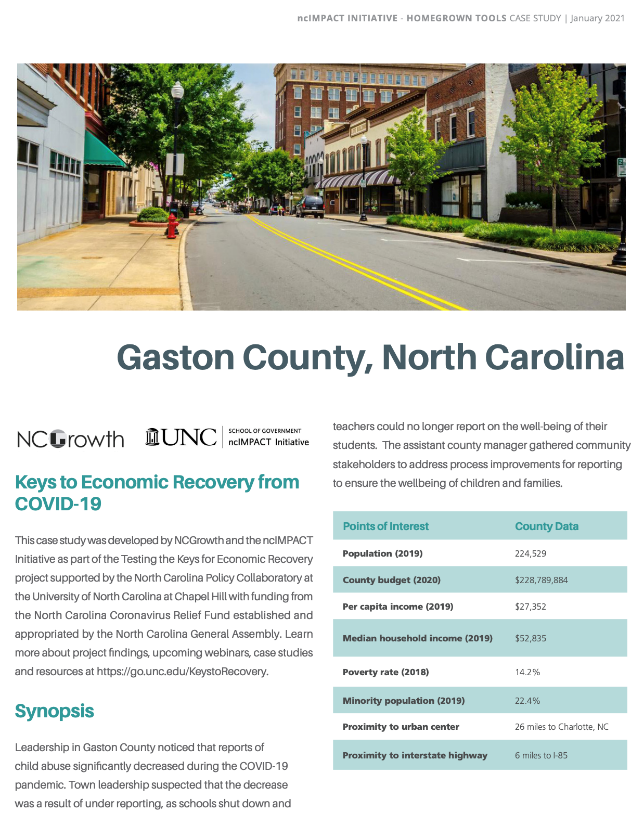
Homegrown Tools Case Study: Gaston County, NC
01/31/21“The BrightHive partnership was established before the pandemic, as Gaston County had already been working on process improvements for child welfare reporting. Given the unique impact of the pandemic on this issue, the County was able to use CARES Act funds to elevate the work and contract BrightHive to create a data trust. A data trust is a system that brings together data from many different sources, synthesizing it onto one platform. BrightHive is creating a data trust to identify new, and more resilient sources of data and data-sharing networks to provide the information human services staff need to keep children safe from abuse and/or neglect.”
…
Continued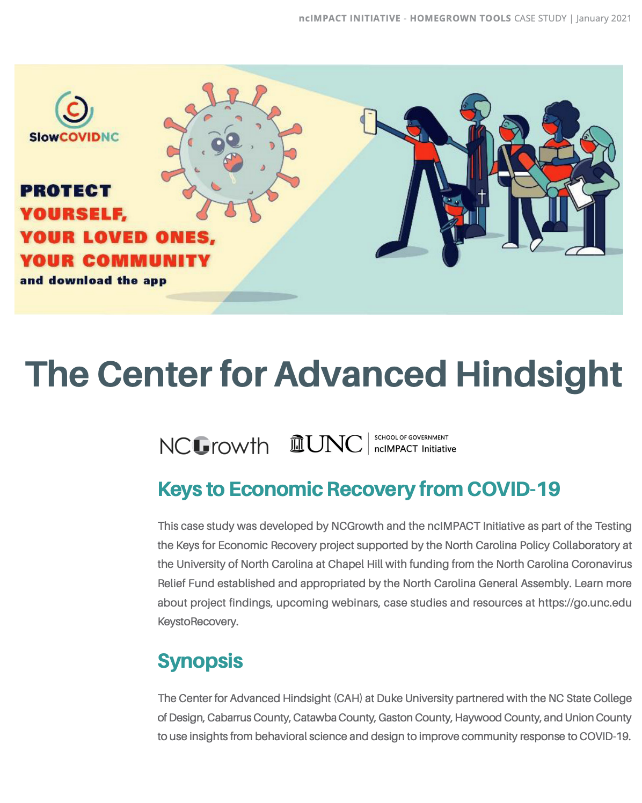
Homegrown Tools Case Study: The Center for Advanced Hindsight
01/31/21“The Center for Advanced Hindsight at Duke University seeks to use behavioral science to make people happier, healthier, and wealthier through research and human-centered design. With this project, CAH sought to provide behavioral science tools to county governments that would lead to long term behavior change, allowing for safe re-opening and realization of economic opportunities that have been delayed due to COVID-19. Recognizing that a majority of the federal relief funding was targeted to cities, CAH designed the project for counties to test solutions, promote collaboration, and learn from each other.”
…
Continued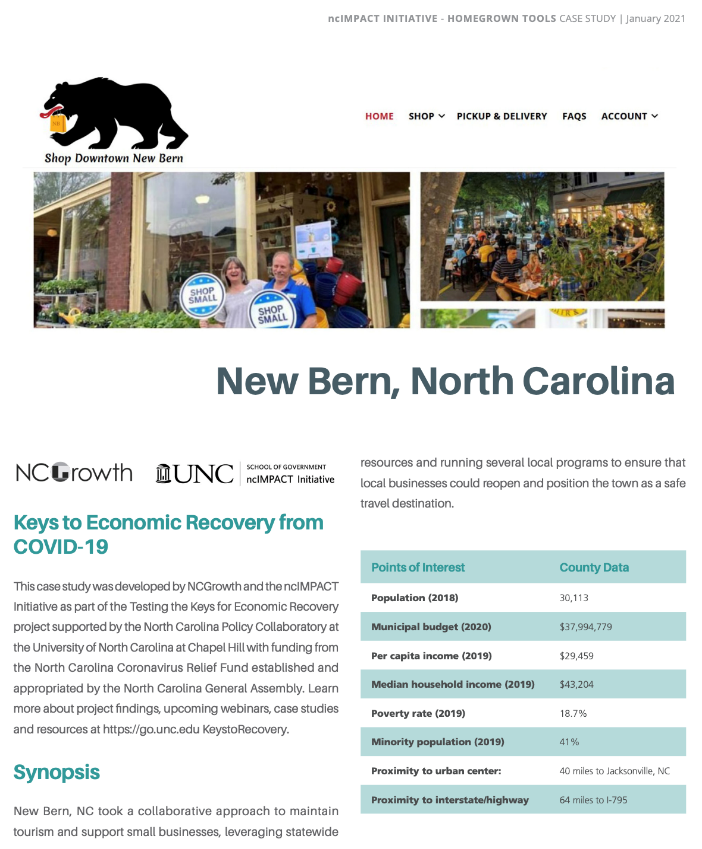
Homegrown Tools Case Study: New Bern, NC
01/31/21“Count on Me NC was promoted to all the destination marketing organizations across North Carolina. Visit New Bern, New Bern’s tourism development authority, was an early adopter and went further to partner with Visit NC through their cooperative marketing program to promote the town as a safe travel destination. Visit New Bern encouraged local restaurants, hotels, and other businesses to get the Count On Me NC certification so that they could position the town as a safe travel destination.”
…
Continued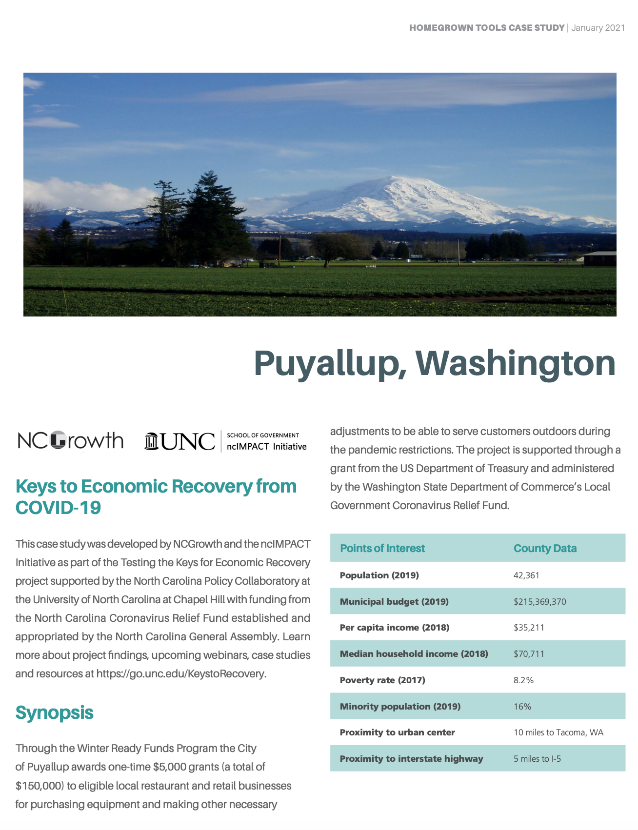
Homegrown Tools Case Study: Puyallup, WA
01/31/21“The City of Puyallup is a commuter city in the Puget Sound region of Washington. Puyallup’s economy relies heavily on the retail, restaurant, and visitor services industry of its commercial district, anchored by South Hill Mall, and its historic downtown. The unique nature of the COVID-19 pandemic and the indoor capacity restrictions negatively impacted local businesses. To allow for retail and restaurant businesses to operate according to public health guidelines, the City created a grant to support businesses’ efforts to prepare for the colder winter temperatures and continue to provide services outdoors.”
…
Continued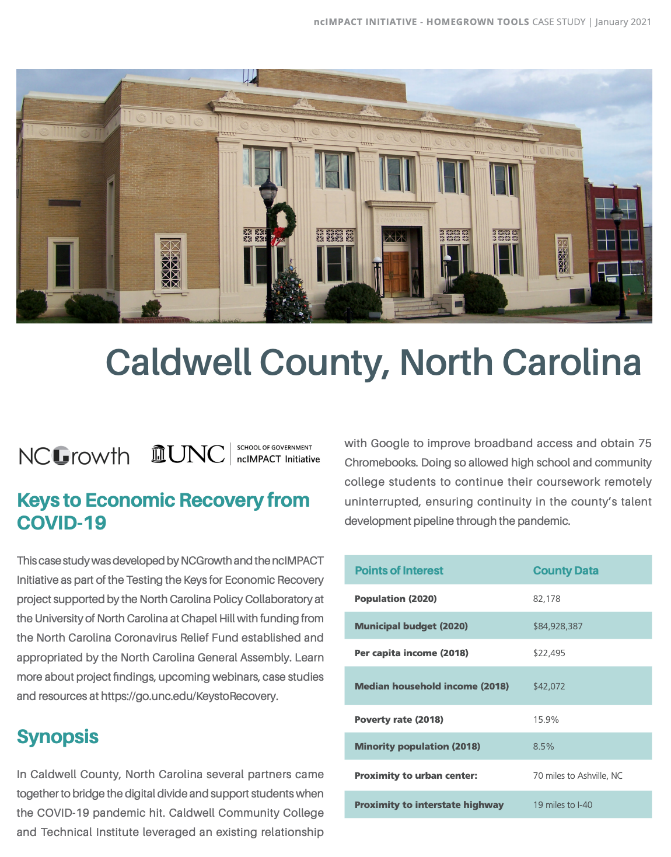
Homegrown Tools Case Study: Caldwell County, NC
01/31/21“CCC&TI first consulted with the county health department and other healtcare entities to understand the scope of the problem. CCC&TI also surveyed students and conducted outreach through social media to understand their needs. They found 111 students in curriculum courses without internet access, 78 without devices, and 40 lacked both. Based on this information, leadership reached out to Google to explore techincal solutions. The college has a longstanding relationship with Google and their history of collaboration and trust made it easy to work together to address this emergency need.”
…
Continued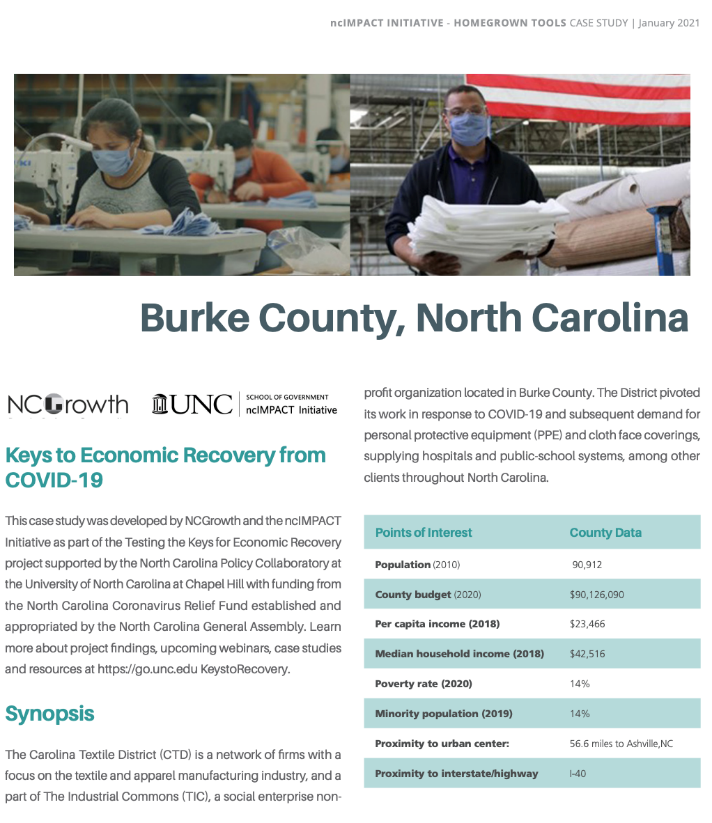
Homegrown Tools Case Study: Burke County, NC
01/31/21“During the COVID-19 pandemic when demand for regular products slowed down, this network and support structure enabled CTD to quickly meet the increased need for personal protective equipment (PPE) and cloth face coverings. Their overall structure did not change, but rather shifted to meeting specific needs by adding new partners and contracting with new clients.”
…
Continued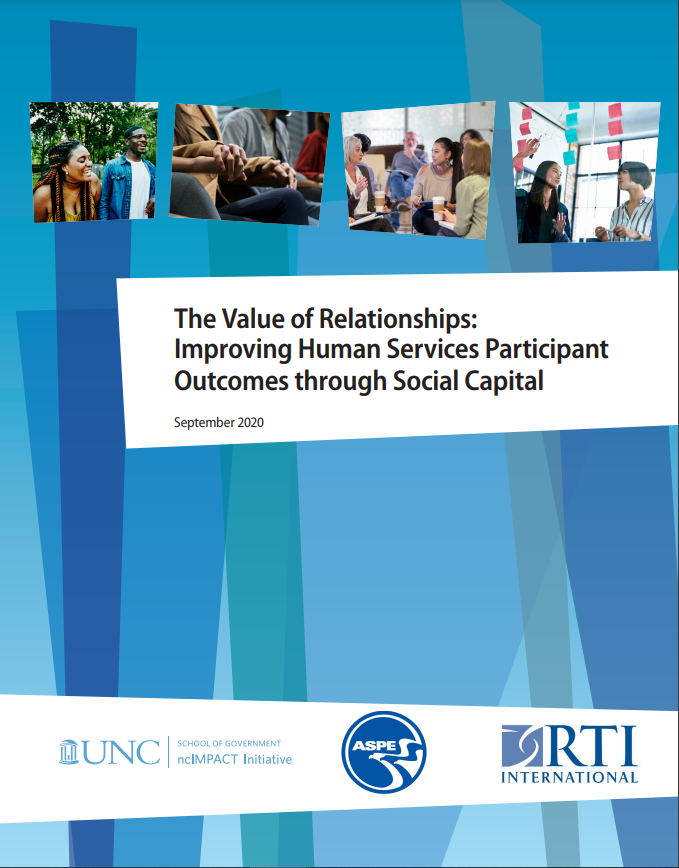
The Value of Relationships: Improving Human Services Participant Outcomes through Social Capital
09/01/20Social capital focuses on the personal relationships and networks that each of us has and how we use them. For many human service program managers, social capital may be key to reaching program goals. In fact, whatever your role in the organization, your skill at helping participants build and benefit from their own social capital may in some cases be as central to your program’s success as securing funding.
…
Continued
Emerging Social Capital Principles and Practices
06/17/20According to our expert advisors, before individual practices are put in place, certain principles – referred to by those involved as ideas, convictions, or values — need to exist in programs first. They should be recognized and used by staff. All aspects of a social capital-based approach rely on these principles.
…
Continued
Strengthening the Social Capital of Incarcerated and Reentering Individuals: Six Considerations
06/01/20Incarcerated and reentering populations frequently lack strong, positive relationships for a variety of reasons, including never having these relationships to begin with or having lost connections during their incarceration. When these relationships do exist, they can be very valuable in helping individuals prepare for and succeed in reentry, such as through reducing their risk of recidivism and poverty and improving their well-being and employment prospects, leading to healthier, safer, and more productive communities. However, there is little research on how reentry programs can more intentionally help reentering or incarcerated individuals strengthen and develop relationships by incorporating concepts like social capital to meet these objectives. This brief identifies and analyzes common features and learnings from four programs that emphasize social capital while working with incarcerated or reentering individuals.
…
Continued
Finding a Better Way: A Case Study on Challenges to Inclusive Economic & Workforce Development
12/01/19“Taken together, these results show that working people are challenged to earn enough to make ends meet. One common way to increase compensation is to increase a worker’s level of education and training, and indeed, among the eight overall categories of needs in our survey, 64 percent of respondents chose “Education and Training” as one of the three most important. It was the most-chosen response, with “Employment Support” the next highest at 46 percent (Figure 3).”
…
Continued
The Forsyth Story: A Strategy for Creating a More Inclusive Economy
02/01/19“The ncIMPACT team analyzed demographic data, the results of an electronic survey of Forsyth residents and workers, and comments recorded during interviews and focus groups to distill the county’s present challenges to ten overarching themes”
…
Continued
NC PRE-K PROGRAM FACT SHEET
09/01/17“Program effectiveness
• According to a UNC evaluation of the 2015-16 school year, NC Pre-K demonstrated consistent, positive effects on children’s skills at the end of kindergarten in two key domains of learning—math and executive function.
• A UNC summary of annual NC Pre-K evaluations conducted from 2002 to 2016 stated that poor children who attended the program fared better on third-grade reading and math end-of-grade tests than poor children who did not attend.
• A Duke University study published in 2016 found that North Carolina’s investment in pre-K and Smart Start has resulted in higher test scores, less grade retention, and fewer special education placements through fifth grade.
• According to the study, the benefits extended beyond students who attended pre-K—that is, being in class with former NCPre-K students helped non-attendees do better in later grades.”
…
Continued